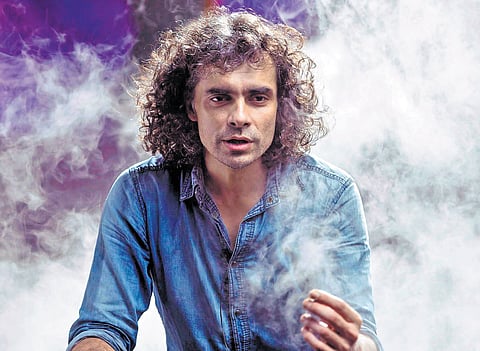‘Didn’t change approach for OTT’: Imtiaz Ali
You seem to have a special connection with Punjab. It has served as the backdrop of several of your films—Jab Harry Met Sejal, Jab We Met, Highway. Your latest, Chamkila, is a biopic on the state’s beloved singer Amar Singh Chamkila. What made you want to tell the story of the man who came to be called the ‘Elvis of Punjab’?
I am indeed drawn to Punjab; and whenever I visit, a new connection is built. I feel a sense of elation when I am there; it is the sheer vibe of the place, be it its people, culture, food or music. During one such trip,
I realised that people spoke passionately about Chamkila, and at the end of the day, you are bound to hear his songs playing out of trucks, and in the dhabas. I was intrigued as to who this person, being revered as the OG, was. When I got to know about his life, everything was dramatic. He was from the lower cast and uneducated, but he went on to become the highest record-selling artiste of all times.
His life just seemed so inspiring and, more than anything else, I was drawn to the fact that he was a grassroots person; someone who represented the real India. He was not an English-speaking city star. This is my first biopic. It has been constructed from facts, and I had promised myself that I would not take creative liberties.
I am essentially a fiction film director, but this allowed me to reconstruct and construct, to be more insightful than imaginative. I assume that when people start watching the film, they won’t know about him, and it should help them understand Chamkila, as a person and an artiste.
The 80s were a trying time for Punjab. Chamkila, however, kept making songs, which were labelled vulgar. And, he was murdered at the young age of 28. One cannot help but bring in the question of censorship here. Was that an aspect you were keen on exploring through the film?
One of the main reasons for making Chamkila was to explore the question of who decides what is right and wrong for people to view or listen to. And everybody has a condescending view about an artiste who is popular; there’s this double standard of enjoying his music, and then not admitting that they listen to him. Also, he was not political at all. He was criticised for composing songs of happiness and lust while Punjab was burning. But, he was devoted to the cause of making music. He wanted to give them entertainment and relief in a time that was so dark.
The film marks your reunion with AR Rahman, 13 years after your last collaboration for Rockstar. Tell us more. Also, how tough is it to compose music for a film which already has music?
Rahman sir was most excited, and said this is going to be my first all-Punjabi album. He has used instruments, which have not been used in Punjabi music for a long time. But, the first thing that we did was get a bunch of the real, hardcore musicians of Punjab, to come and play in Rahman sir’s studio, and we ended up borrowing heavily from them.
We have also blended the original Chamkila songs, which have been sung by Diljit Dosanjh and Parineeti Chopra, as well as Rahman sir and me. Chamkila never made songs about his own life, so all that the film is doing is taking the story forward. We have tried to create a musical theatre-like experience.
Is it true you were not sure of casting Diljit Dosanjh initially?
I was under the impression that it would not work out with him. So, I kept meeting other actors, until I finally reached out to Diljit, and he confessed that there wasn’t a bigger fan of Chamkila than him. He hails from a place close to where Chamkila lived. Though from different backgrounds, the purity in their music is similar. Also, not only does Diljit understand the legacy of the man, but also has knowledge of the nuances of Punjabi music.
You have made this film for Netflix. Do you feel the streaming space gives you more creative freedom than the big screen?
To be honest, it was the same process for me. I didn’t change my approach because it was for the OTT. I want to watch films that are cinematic on the digital medium, so I just went ahead and made this even more cinematic. Also, the team at Netflix was very accepting of my vision.

